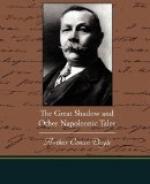I could never make out what his age could be, nor could Jim Horscroft either. Sometimes we thought that he was an oldish man that looked young, and at others that he was a youngish man who looked old. His brown, stiff, close-cropped hair needed no cropping at the top, where it thinned away to a shining curve. His skin too was intersected by a thousand fine wrinkles, lacing and interlacing, and was all burned, as I have already said, by the sun. Yet he was as lithe as a boy, and he was as tough as whalebone, walking all day over the hills or rowing on the sea without turning a hair. On the whole we thought that he might be about forty or forty-five, though it was hard to see how he could have seen so much of life in the time. But one day we got talking of ages, and then he surprised us.
I had been saying that I was just twenty, and Jim said that he was twenty-seven.
“Then I am the most old of the three,” said de Lapp.
We laughed at this, for by our reckoning he might almost have been our father.
“But not by so much,” said he, arching his brows. “I was nine-and-twenty in December.”
And it was this even more than his talk which made us understand what an extraordinary life it must have been that he had led. He saw our astonishment, and laughed at it.
“I have lived! I have lived!” he cried. “I have spent my days and my nights. I led a company in a battle where five nations were engaged when I was but fourteen. I made a king turn pale at the words I whispered in his ear when I was twenty. I had a hand in remaking a kingdom and putting a fresh king upon a great throne the very year that I came of age. Mon Dieu, I have lived my life!”
That was the most that I ever heard him confess of his past life, and he only shook his head and laughed when we tried to get something more out of him. There were times when we thought that he was but a clever impostor; for what could a man of such influence and talents be loitering here in Berwickshire for? But one day there came an incident which showed us that he had indeed a history in the past.
You will remember that there was an old officer of the Peninsula who lived no great way from us, the same who danced round the bonfire with his sister and the two maids. He had gone up to London on some business about his pension and his wound money, and the chance of having some work given him, so that he did not come back until late in the autumn. One of the first days after his return he came down to see us, and there for the first time he clapped eyes upon de Lapp. Never in my life did I look upon so astonished a face, and he stared at our friend for a long minute without so much as a word. De Lapp looked back at him equally hard, but there was no recognition in his eyes.
“I do not know who you are, sir,” he said at last; “but you look at me as if you had seen me before.”




